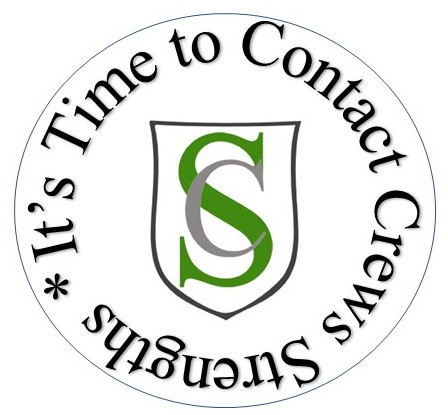Blog
It’s Time to Put Your Strengths to Work: Why Hire a Coach?

Hiring a Career, Life or Executive coach usually starts when a nagging problem or an unobtained goal begins to bother you.
“I need to find a more rewarding career.”
“I need to get along better with my coworkers.”
“What makes me tick?”
“Why can’t I communicate with my parents, spouse, kids?”
“How can I lead?”
“How can I earn what I am worth?”
Before reaching out to a coach, most people seek answers closer to home. Frequently, it starts with an attempt to work it out on your own. After all, why go to someone who doesn’t know you to find answers to questions about yourself. Why can’t you figure these things out on your own? I mean, who knows you better than you?
The problem is that as an expert on yourself, you are the most subjective expert imaginable. No matter how sincere and honest you are, you cannot be truly objective when it comes to you. You can only go so far as your own batting coach or voice coach because you cannot accurately see or hear yourself from the inside.
“Well then, can’t my friends do a better job than some stranger? My friends know me, right? Maybe I can talk to my spouse about this?” Of course, sharing problems, dreams and concerns with your confidants can be helpful.
Talking to people who love, like and respect you, is not a bad thing. However, friends and family have a vested interest. Your friends and family love you as much in spite of who you are as they do because of who you are. Friends and family can help, but they tend to lack perspective.
Why could a coach be a better source for finding a path through your conundrum?
If you have ever played a sport above the pickup game level, you have had a coach. If you exhibited a talent for singing, acting or playing a musical instrument, you might have sought out a coach, even if you referred to him by another title.
Coaches serve at least three purposes. First, a coach is an expert and an instructor. Second, a coach is a cheerleader, calling on you to put forward your best effort and letting you know when you have done well. Third, a coach is a guide or mentor helping you reveal talent and develop skill.
The coach, in the teaching stage, imparts rules and teaches skills. Maybe Mr. Fonebone wasn’t the foremost authority on curve balls, getting out of sand traps or arpeggios, but at the time, he knew a heck of a lot more than you did. The teaching level of coaching is about the basics and about the development of skills. In sports, it is about what is fair and foul. A ball over here is in play, while over there it is out of bounds. This is the way to stand, to hold the club or racquet, to increase your speed. In music, its learning what the dots with lines and squiggles mean ♩♪♬ ♫ ♫ when they appear on those five lines.

The encouragement element of coaching reinforces accomplishment and induces commitment. If you have talent, encouragement keeps you working on skills to which you will ultimately be able to apply talent.
The guide and mentor function of coaching is the expertise phase. It is where talent can apply the skill learned in the earlier phases, to rise to the surface.
Michael Phelps had to learn the mechanics of the butterfly stroke before he could master its finer points (breathing, timing, coordination, etc.) to completely dominate men’s swimming at four different Olympic games.
Tom Brady’s football “life” started by attending San Francisco 49ers football games as a child. He then participated in football camp as a child and played at every level from junior varsity through college. As time went on, he applied what he saw and was taught, perfected those basics, leaned into his talent, and according to almost every statistic, has become the greatest quarterback in NFL history.
Phelps and Brady were both coach-able on the basics and then because of their talent, became coach-able on the details. The teaching part of coaching allowing the refinement and mentoring to find a home worthy of the amazing talent. Encouragement kept them going. Then practicing and perfecting the skill, through their talents, their performance was honed to “a razor’s edge”.
When you need to “up your game” at work, you may try numerous things. Let’s say, you are frustrated by your job. You believe you have more potential than your bank account, self-esteem and accomplishments indicate. You probably grouse or complain to your spouse. Maybe you kibitz about it with friends over a coffee or a beer. You may do a little googling. You might try finding a book that addresses your concern. Each of these approaches has merit and may very well help. Any one of them might also lead to coaching.
Realize that there are literally thousands of people who have raw talent who never reach their potential because they never found the right coach. They didn’t get the basics, the encouragement and refinement coaching could have offered. What a crying shame.
A coach is outside of you. A coach is a disinterested and objective assistant in your search for answers. Disinterested does not mean uninterested. Instead it means free of bias. Free of bias, is something you can never be about yourself. A great coach wants you to succeed but can only do so if she can observe what you are doing and then get you to stop shanking the ball or singing those three notes off key or draw out your best traits for success.
A coach should be your Sherpa, your guide and your confidant on the trek up the mountain. However, a coach must let you do the work. In a game or when the curtain goes up, the coach is on the sidelines or backstage. You are on the line of scrimmage or downstage center. But the coach can help you discover how to apply your talent.
Coaches can also help you dissect your mistakes. Great “players” make mistakes. Part of what makes them great is that they learn from their errors and develop ways not to repeat them.

While you may be an expert on yourself, sometimes you may misjudge what is causing your thoughts and actions. You think you should be one way when acting differently might be more successful and make you happier. Some of this is about blind spots. As the statement on your rear-view mirrors say, “Objects in mirror are closer than they appear.” Yes, you can see them, but experience teaches you where that object really is. Sometimes you have been told something about yourself for so long that you can’t let go of it. It’s like hanging onto a piece of clothing that doesn’t fit, but you cannot get rid of it.

Think of yourself in a bottle with a label, glued to the outside, describing who you are. Part of your confusion, is that you can ‘t clearly make out what the label says. It’s backwards from your perspective and not very readable through the paper and the bottle. You can probably make out some of it plain as day, but some of it is dark and some of it is blurred. A coach can help. A coach can shine a light on the label and help you make out words and images.
There are many types of coaches. Professional sports teams have a variety of coaches in their ranks, each of whom concentrates on a particular position or elements of play: defensive coordinator, pitching coach, skating coach. Life and career coaching can be viewed similarly. Different needs may be better served by different approaches.
At Crews Strengths, we believe that everyone has talents. By understanding your talents (your hows, whys and motivation), we help you develop them into Strengths. The effectiveness of our coaching is about discovering talents and then helping you to develop them into Strengths.
Growing up, Tom Brady was a talented athlete, playing a variety of sports. At some point, a coach, noticed Brady’s exceptional talent at football. He mastered the skills needed to be a quarterback. As he advanced his skills, his talents became more evident.
Just like in sports or on stage, in your life or career, a coach can help. A coach can help you understand your talents, encourage your efforts, point out errors and clarify goals.
If you think it’s time to hire a coach, Crews Strengths specializes in talent discovery and optimization, especially in the workspace. Let’s schedule a time to talk. Drop me a line at donald.i.crews@crewsstrengths.com or via the contact me page.
It’s Time to Put Your Strengths to Work.
Previous Posts
- “It’s Time for You to Ask the Questions!” - August 8, 2024
- What “Superpowers” are Hiding in Your Toolbox?: - May 29, 2024
- It’s Time to Put Your Strengths to Work for Your Interview – Part 4 - October 16, 2023
- It’s Time to Put Your Strengths to Work for Your Interview – Part 3 - August 21, 2023
- It’s Time to Put Your Strengths to Work for Your Interview – part 2 - July 20, 2023
- It’s Time to Put Your Strengths to Work for Your Interview - June 22, 2023
- It’s Time to Put Your References to Work - February 14, 2023
- It’s Time to Work Around Your Weaknesses - November 15, 2022
- It’s Time to Put Your Skills, Talents, Strengths (and even Weaknesses) to Work! (Once you figure out what they are). - October 13, 2022
- It’s Time to Put Your Strengths to Work: Why Hire a Coach? - August 1, 2022
- It’s Time to Put Your Strengths to Work: Rejection and the Job Search - June 25, 2022
- No One Deserves to HATE Their Job! : Your Solution to the “Great Resignation” - May 23, 2022
- It’s Time to Put Your Strengths to Work: Strengths and the Reentry Career Alliance Academy - March 3, 2022
- It’s Time to Put Your Resume to Work: Part 11. An Inventory of Your Career: Resume as Assessment - February 3, 2022
- Have Yourself a Merry Little Job Search: - November 23, 2021
- It’s Time to Put Your Resume to Work: Part 10. - October 21, 2021
- It’s Time to Put Your Resume to Work: Part 9 – Avoiding the Trash - August 25, 2021
- It’s Time to Put Your Resume to Work: Post 8. How Dressed Up Does Your Resume Need to Be? - July 20, 2021
- “It’s Time to Put Your Resume to Work” : Part 7: What to Do When You Don’t Meet All the Requirements - June 24, 2021
- “It’s Time to Put Your Resume to Work”: Part 6. Avoiding the Mundane, Boring, and Useless - May 26, 2021
- “It’s Time to Put Your Resume to Work”, Part 5 – Creating a Universal Resume (When you Don’t have All the Facts) - May 5, 2021
- “It’s Time to Put Your Resume to Work” – Part 4: Finding the Words (literally) - April 7, 2021
- BONUS – “It’s Time to Put Your Resume to Work”- Part 3a : What is the Correct Length for Your Resume? - March 25, 2021
- “It’s Time to Put Your Resume to Work”- Part 3 : The a la Carte or Customizable Resume - March 16, 2021
- It’s Time to Put Your Resume to Work – part 2 - February 9, 2021
- It’s Time to Put Your Resume to Work – part 1 - January 27, 2021
- Strengths Help You Hear the Music - October 20, 2020
- StrengthsFinder & the Ancient Philosopher - September 3, 2020
- StrengthsFinder Domains: A View of Your Strengths from 50,000 Feet - July 20, 2020
- Talents are Your Edge in a Job Search - June 25, 2020
- This Is Who You Are and That’s A Good Thing - May 22, 2020
- Introvert or Extrovert: A CliftonStrengths view - May 13, 2020
- Is It Time to Put Your “Superpowers” to Work? - April 10, 2020
- Who Are You? - April 3, 2020
